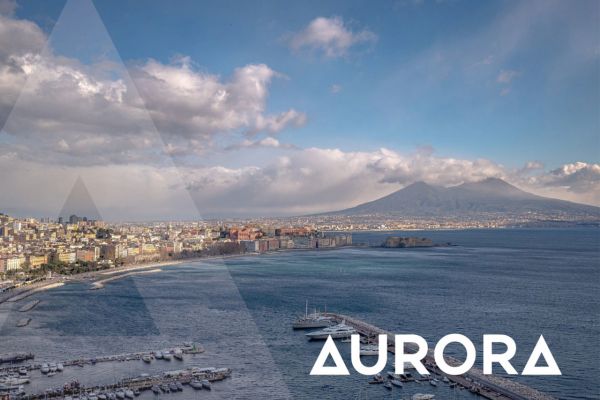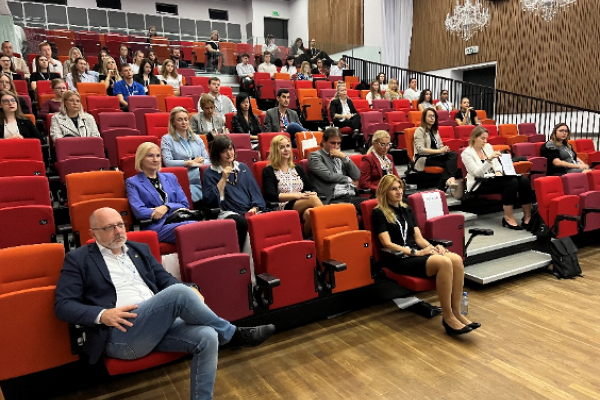On 29 and 30 September 2025, the Aurora international academic conference “DUAL – Dichotomies in Urban Agendas and Logics“, an event promoted within the framework of the European Universities Initiative programme Aurora 2030, will be held at the Department of Humanities of the Università Federico II of Naples (UNINA), Italy.
An activity organised within the Aurora educational hub Cultures: Identities and Diversities, the conference is a continuation of the course Challenges in Europe that took...
The Aurora Scientific Council is meeting at Palacký University
More than 50 projects, including 15 with the involvement of Palacký University, have been submitted to the second round of the Aurora Open Call for Incentive Research Collaboration, which aims to foster closer cooperation between European universities. Applicants can receive up to €25,000 for a joint international project. The call also supports the organisation of thematic summer schools and the mobility of early-career researchers. Members of the Aurora Research Council met at Palacký University,...
Palacký University launches new international Master’s programme: Digital Society
Digitalisation, artificial intelligence, and new technologies are fundamentally changing the way we live, work, and communicate. And so Palacký University Olomouc has now launched the new Digital Society, Social Innovation and Global Citizenship (DIGISOC) Master’s degree programme, jointly developed with the University of Innsbruck and University of Naples Federico II. It will provide students with key skills for the future via some of the best experts from the three universities in order to understand...
UP to Join the Leadership of the Euridice Project
The Euridice project (EURopean Inclusive education for Digital society, social Innovation and global CitizEnship) is undergoing significant changes that will shape its future direction and development. Palacký University will newly take part in leading the project, which will result in a substantial increase in its budget. The upcoming joint degree programme DIGISOC, whose proposal was approved by the UP Educational Committee in December, is scheduled for final approval by the UP Internal Evaluation...
Call for Incentive Research Collaboration
The second year of the open call of the Aurora alliance aims to contribute to closer cooperation between European universities. Up to 25,000 euros can be obtained for a joint international projects. The call also supports the organization of thematic summer schools, with an amount of up to 20,000 euros. The third supported activity is short-term mobilities aimed at young scientists. In last year’s call, three projects connected with UP succeeded. This call will be repeated on an annual basis...
UP organises Aurora BIP on How to increase the Social impact of Teaching by using LOUIS Competencies
UP is organising its first Aurora Blended Intensive Programme entitled How to Increase the Social Impact of Your Teaching: Using the LOUIS Competence Framework to Improve Your Course. This BIP is organised by Maxim Tomoszek at the Faculty of Law with the support of the Aurora education developer, Markéta Šemberová. Maxim Tomoszek leads the Aurora 2030 programme’s LOUIS component.
LOUIS is a tool that supports academic teachers in articulating learning outcomes for general academic and...
International scientific meeting in Innsbruck combines natural sciences and humanities
Under the auspices of the European universities united in the Aurora Alliance, the University of Innsbruck organised a completely unique Erasmus double BIP (Blended Intensive Programme) from 20 to 25 October 2024. More than 40 educators, scientists and administrative staff from Palacký University, the University of Innsbruck, the University of Duisburg-Essen, the Université Paris-Est Créteil, the University of Iceland and, last but not least, the Universitat Rovira i Virgili combined the two areas...
An increasing number of students from Aurora universities attending UP courses. We want to welcome more for the summer semester!
There is an increasing interest in UP education from across eight Aurora partner universities. A record 20 students registered for the courses offered by UP (8 courses in total, 3 of which require physical attendance, 5 are in a hybrid format).
The most popular courses were those taught by Dr. Ankush from the Faculty of Science (Free radicals in Biology and Biomedicine) and Dr. Voráč from the Faculty of Education (Media Education). Students also further registered for the courses taught by Dr....
Aurora Staff Training in Kosice: Ways Forward in Fostering Inclusive and Enriching Practices and Policies at the Aurora Universities
On September 24, the second Aurora Capacity Development Training Event of this year was held in Kosice, Slovakia, titled “Diversity and Inclusion – Ways Forward in Fostering Inclusive and Enriching Practices and Policies at the Aurora Universities.”
The event gathered 65 participants, including senior management, academics, administrative staff and international and domestic students from Pavol Jozef Šafárik University (UPJS). Representatives from South-West University “Neofit Rilski”...
UP succeeds in Aurora’s open call and receives support for projects, summer schools, and researcher mobilities
The first open call aimed at fostering international scientific and academic collaboration, research mobilities, and thematic summer schools, was very much welcomed across the Aurora network. UP is the coordinator of one of the seven supported projects and participates in two others as a partner. It will also participate in the organisation of a summer school and will send two students for research mobilities at partner institutions.
The Call for Incentive Research Collaboration was launched...












